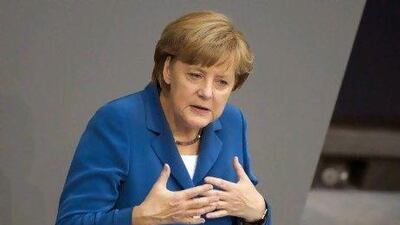BERLIN // The German chancellor Angela Merkel yesterday brushed aside the latest push to pool European debt, arguing that it would be "economically wrong and counterproductive" to make such a move before governments can be made to comply with budget rules.
In the run-up to another European Union summit, Mrs Merkel is facing mounting pressure to soften Germany's fierce resistance to jointly issued eurobonds or other forms of debt pooling.
Though eurobonds could reduce borrowing costs for euro-zone stragglers, such as Spain and Italy, they could increase them for Germany and some others. Berlin worries about being liable for the debts of other countries without being able to ensure that they push through economic reforms.
Leading European officials have drawn up a plan ahead of the summit, which starts today, that proposes a "medium-term" move towards eurobonds, as well as the creation of a banking union with a single authority. They also called on the 17 euro countries to surrender more control over their national budgets, in an apparent nod to German concerns.
Speaking to Germany's parliament, Mrs Merkel made it clear that was not enough. She noted that the plan called for pooling debt first and only then enforcing greater budget controls.
"I fear that at this summit there will again be much too much talk about all sorts of ideas for common liability, and much too little about improved controls and structural measures," she said.
"Quite apart from the fact that instruments such as eurobonds, euro bills, debt redemption funds and many others are constitutionally impossible in Germany, I consider them economically wrong and counterproductive," Mrs Merkel added.
She said that only when sufficient budget supervision was ensured could any such measures even be considered. With European capitals wary of giving up sovereign powers, that could take years.
Mrs Merkel also yesterday met the French President Francois Hollande, who promotes eurobonds as a way out of Europe's debt crisis.
Facing criticism of her austerity-led approach, she has talked increasingly in recent months of fostering economic growth.
Last week, she agreed with Mr Hollande and her Italian and Spanish counterparts to push for a growth package worth up to €130 billion (Dh477bn) at this week's summit.
But she has stuck firmly to her insistence that European countries must tackle their economies' uncompetitiveness and heavy debts in a step-by-step process - and that they cannot make the continent's problems go away in one stroke.
Yesterday, she opened her speech by dismissing expectations that the EU summit today and tomorrow would bring the crisis to an end.
"Because I know the expectations and hopes that are pinned on this summit, I will repeat right at the start what cannot be said often enough," she said. "There is no quick solution and no simple solution. There is no one magic formula ... with which the government debt crisis can be overcome in one go."
She said Europe must solve its problems step by step. "Anything else is condemned to fail from the start," she added.
German politicians are due to vote tomorrow on Mrs Merkel's cherished European budget-discipline pact and on the euro zone's permanent rescue fund.
"We are further than ever today from a Europe of stability, solidarity and confidence," said Frank-Walter Steinmeier of the main opposition Social Democrats yesterday.
"That has to do with you and your government as well, Mrs Merkel ... you haven't been part of the solution so far. You are, and were, part of the problem."

